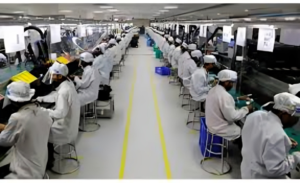Apple Pledges Additional $100 Billion in US Manufacturing During White House Event
Introduction
In a high-profile Oval Office ceremony on August 6, 2025, President Donald Trump and Apple CEO Tim Cook announced that Apple will invest an additional $100 billion in U.S. manufacturing over the next four years. This move boosts Apple’s total domestic investment commitment to $600 billion, marking the largest single expansion of its American Manufacturing Program (AMP) to date (Apple). The announcement underscores the ongoing “America First” agenda, aiming to create jobs, strengthen domestic supply chains, and secure advanced technology production on U.S. soil.

Why This Matters
By committing another $100 billion, Apple reaffirms its pledge to support more than 450,000 existing supplier and partner jobs across all 50 states while directly hiring 20,000 new positions focused on R&D, silicon engineering, and AI development (Apple, Investopedia). Key objectives include:
- Expanding Advanced Manufacturing: Incentivizing global suppliers to build critical components domestically.
- Boosting Exports: Roughly two-thirds of U.S.-made Apple components serve customers outside the U.S.
- Strengthening National Security: Local chip, glass, and module production reduces reliance on foreign supply chains.
Details of the New Investment
Apple’s accelerated AMP rollout highlights several critical initiatives:
- Partnerships with American Firms: Working with ten major suppliers—Broadcom, Applied Materials, Texas Instruments, MP Materials, Corning, Amkor, GlobalWafers, TSMC (U.S. operations), and others—to expand capacity and capabilities stateside (Investopedia).
- Corning Kentucky Facility: All iPhone and Apple Watch cover glass will be produced at Corning’s plant in Kentucky, ensuring high-precision manufacturing under U.S. oversight (Investopedia).
- Tariff Exemption: Trump announced a 100 percent tariff on imported semiconductors but exempted companies that commit to onshore manufacturing—Apple being a prime beneficiary of this carve-out (Reuters).
Key bullet points:
- Total U.S. Investment post-announcement: $600 billion.
- Additional direct hires: 20,000 workers.
- Supplier jobs supported: 450,000+ nationwide.
- States with significant expansions: Arizona, California, Iowa, Kentucky, Nevada, New York, North Carolina, Oregon, Texas, Utah.
Economic and Strategic Impacts
- Job Creation & Skills Development
- Apple plans to establish an advanced manufacturing academy in Detroit to train workers in precision engineering and AI integration (Wikipedia).
- The initiative supports thousands of high-wage R&D and engineering roles, driving regional economic growth.
- Supply Chain Resilience
- Domestic production of semiconductors, glass, and Face ID modules decreases vulnerability to global disruptions (Reuters).
- Encourages U.S. firms to invest in state-of-the-art fabrication and testing facilities.
- Market and Shareholder Response
- Apple shares rose over 5 percent following the announcement, reflecting investor confidence in domestic reshoring efforts despite year-to-date pressures from AI competition and tariffs (Investopedia).
- Analysts note that while full device assembly remains primarily overseas, expanded component manufacturing is a strategic win.

Challenges and Considerations
- Cost Constraints: High labor and compliance costs in the U.S. make full iPhone assembly domestically a long-term goal rather than an immediate reality (Reuters).
- Global Trade Dynamics: The 100 percent chip tariff, while bolstering domestic production, may invite retaliatory measures or shift supplier strategies away from U.S. markets.
- Technological Complexity: Advanced semiconductor fabrication requires years of infrastructure build-out and skilled workforce training—factors Apple and partners must navigate carefully.
Conclusion
Apple’s new $100 billion investment builds on its strategic commitment to U.S. manufacturing, leveraging public-private collaboration to create high-value jobs, secure critical supply chains, and reinforce American technological leadership. While hurdles remain—especially around full device assembly—the expanded focus on domestic component production marks a significant step toward reshoring foundational elements of the global electronics industry. As Apple implements its American Manufacturing Program, its success will hinge on balancing cost, innovation, and geopolitical considerations, shaping the future of both the company and U.S. manufacturing at large.